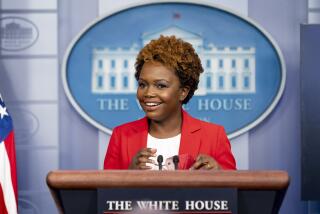Tells Aides He Won’t Deal With Emotion-Charged Social Matters : Quayle to Focus on Broader Issues
- Share via
WASHINGTON — Vice President-elect Dan Quayle, who has vowed not to be a “so-called spear carrier” for the Republican right wing, has told aides that he will not spend time on abortion, school prayer and other social issues dear to the hearts of conservatives during the Reagan era.
Instead, Quayle will attempt to shift the focus of debate to broader and less confrontational questions, such as how to strengthen family values, improve education and deal with the problems of the structurally unemployed and disadvantaged.
Quayle’s view is that, although abortion and other emotion-charged social issues remain major factors in the eyes of his right-wing constituency, they need not be as prominent on the new Administration’s agenda, especially because there was almost no political movement on them during eight years of Reagan’s presidency, one of the most conservative in the 20th Century.
To Press Key Bush Issues
Rather than get bogged down on such divisive matters, his aides say, Quayle intends to concentrate on the broader issues that will be important parts of Bush’s agenda.
After a campaign battering that shook his confidence and drove him into seclusion, aides say, Quayle is becoming increasingly comfortable in his role and expects to become an important political player in the Bush Administration.
Quayle expects to spend more time than his predecessors in dealing with members of Congress. He expects not only to preside over the Senate but to act as a trouble-shooter for Bush on legislative matters.
Although Quayle sought former Vice President Walter F. Mondale’s counsel and Mondale advised him to spend little time on Capitol Hill, former Senate Minority Leader Howard H. Baker Jr. told him that he could gather crucial information for Bush there that would not be available elsewhere.
Baker convinced Quayle that, as a former senator and congressman with 12 years’ experience on Capitol Hill, he could perform a valuable service for Bush by gathering intelligence for him and carrying Bush’s message to Congress, a Quayle aide said.
Also, Quayle, who served on the Senate Armed Services Committee, plans to speak out on defense and national security issues. In particular, he will elaborate on Bush’s message that the United States needs to be skeptical of Soviet intentions despite the improved relations and arms control agreements achieved by Reagan.
Quayle has told aides that he is deeply skeptical of the Soviets even though he believes there are tremendous opportunities for progress in U.S.-Soviet relations.
Although he has remained mostly out of the public eye since the election, Quayle is planning to make several major speeches soon after taking office on Jan. 20.
He has made it clear that, although he is widely considered to be much more conservative than Bush, he believes there is little difference in their philosophies and that, in any event, he is fully committed to carrying out Bush’s agenda.
Quayle aides say he fully understands that he will have a clearly defined secondary role as a confidential adviser to Bush and that, to be an effective vice president, he will probably have to keep a relatively low profile.
Bush excelled at keeping a low profile until he ran for President, and Quayle has said that Bush will be his model.
Bush’s surprise selection of the relatively unknown 41-year-old Quayle as his running mate was highly controversial even among some of Bush’s strongest allies, who believed that the Indiana senator lacked the depth and background to be a heartbeat away from the presidency.
And, during the campaign, Quayle was besieged by so many questions about his academic record, National Guard service and personal life that he was widely considered a political liability to the ticket and wound up the campaign speaking mostly in small towns where he would be out of the limelight.
Hope for Less Prominent Role
Some Bush advisers still are concerned that Quayle is so controversial and so unprepared to serve as vice president that he could wind up embarrassing the new Administration if he plays too prominent a role.
“He’s been very quiet, almost invisible since the election, but that’s probably best from his standpoint and Bush’s,” said a longtime Bush adviser who asked not to be identified. “He’s immersed himself in homework, learning what to do as vice president, and that’s the best thing he can do.”
Quayle, who is still sorting out his possible role, has been conferring with Bush on a daily basis, and aides say he has been assured that he will have the same regular access to the Oval Office that Bush has had with Reagan.
Among other things, Reagan and Bush have met each week for lunch. But, because Bush begins his days no later than 7 a.m. and is a much earlier riser than Reagan, who usually is at his desk by about 9 a.m., Bush’s work sessions with Quayle are likely to be breakfast meetings, Quayle aides said.
President-elect Bush’s plan for completing his Cabinet has been stalled. Page 31.
More to Read
Get the L.A. Times Politics newsletter
Deeply reported insights into legislation, politics and policy from Sacramento, Washington and beyond. In your inbox twice per week.
You may occasionally receive promotional content from the Los Angeles Times.










